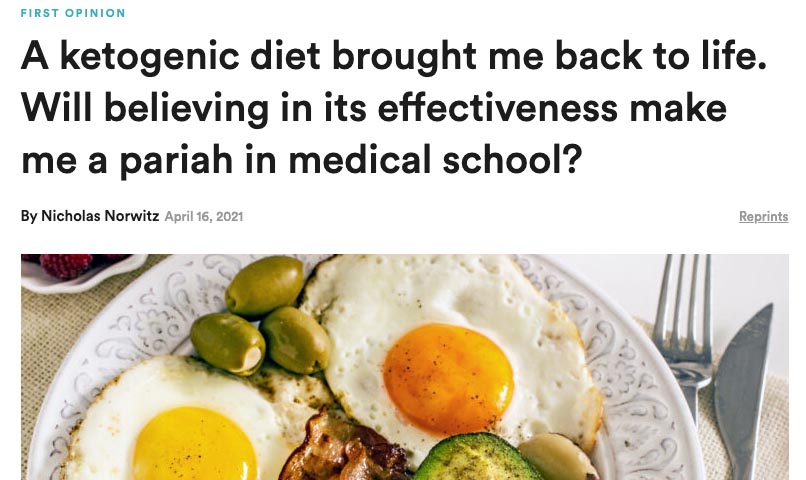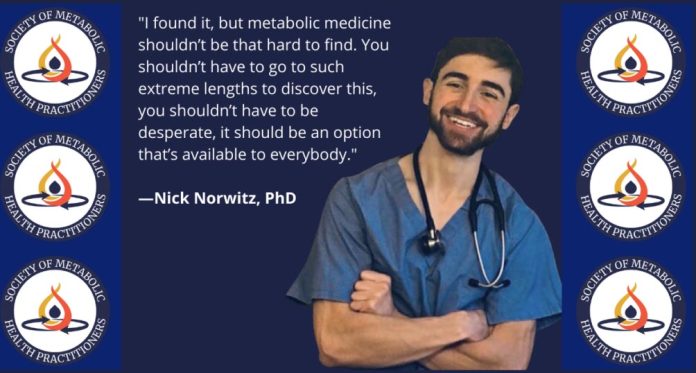英文原名:A ketogenic diet brought me back to life. Will believing in its effectiveness make me a pariah in medical school?
作者:尼古拉斯·诺维茨 博士

日期:2021年4月16日
当我 18 岁被诊断出患有骨质疏松症时,我开始意识到医学知识的局限性。五年后我的濒死体验让这种想法达到顶峰,当我发现所谓的生酮饮食时,这种意识进一步增强。
那五年,作为病人经常在美国和英国一些最好的医疗中心度过,挑战了我对医学的理想主义愿景。现在我以学生身份进入哈佛医学院,我发现自己陷入了尴尬的困境。
18 岁的时候,在马拉松跑步生涯中取得了相对成功的一年后,我开始因骨质疏松症而骨折,这是一种骨骼脆弱的疾病,原本健康的年轻人不应该发生这种情况。经过一系列看似没完没了的测试后,我的医生诊断出我患有运动中相对能量不足 (RED-S) 综合征,这是由于摄入的卡路里不足以匹配一个人每天锻炼所消耗的卡路里。 RED-S 更常见于体重过轻和荷尔蒙异常的女性。我当时很瘦,但体重指数正常,胃口好,没有荷尔蒙异常。然而,我被诊断出患有 RED-S,因为它是排除诊断,这是医学术语,表示“以上都不是”。
治疗?我被指示不惜一切代价摄入更多卡路里,我的内分泌科医生开了最有效的骨骼构建药物。这种组合改善了我脊柱的骨密度,但没有改善我臀部和大腿骨的。
21 岁时,我患上了严重的溃疡性结肠炎,一种炎症性肠病。我的肠胃科医生为我开的药物对我的病情改善甚微,而且我在大学四年级期间继续经历结肠炎发作。当我的同学们担心在考试中选择正确的答案时,我担心不得不在考试中途逃离房间去寻找洗手间。
毕业后,我推迟到医学院攻读牛津大学新陈代谢和神经退行性疾病博士学位。在我到达英国后不久,我经历了一次非常严重的结肠炎发作,以至于我在短短几周内减掉了 20 磅。一天晚上疼痛如此剧烈,以至于大学在凌晨 2 点叫了一辆救护车把我送到附近的医院。
我在医院的心率是每分钟28次,不到正常下限的一半,医生和护士在大厅里窃窃私语。经过三天的测试,主治医师又做出了排除诊断,假设我的肠胃科医生为我的结肠炎推荐姜黄素草药补充剂是导致心率低的原因。我抗议。没有证据表明补充剂会如此极端地降低我的心率。此外,我在入院前已停止服用该补充剂,该化合物在体内停留时间不到一天。
尽管如此,我还是出院了,第二天,也就是我的 23 岁生日,我趴在宿舍里,肠子持续疼痛,心率 20 多。
失去希望,我寻找传统医学之外的解决方案。在接下来的八个月里,我尝试了益生菌、补充剂、冥想和一连串的饮食——无麸质、低 FODMAP、素食、纯素食——但都没有帮助。我犹豫尝试的一种饮食是低碳水化合物、高脂肪的生酮饮食,其中超过 70% 的卡路里通常来自脂肪。我被教导相信高脂肪饮食会导致心脏病并过早地杀死我。也许吧,但我没有什么可失去的。
生酮饮食一周后,我的结肠炎症状开始消失。同样令人印象深刻的是,炎症的关键标志物钙卫蛋白水平下降了七倍,降至有史以来的最低水平,并且在正常范围内。在接下来的几个月里,我停用了结肠炎药物。
两年后,我仍然遵循生酮饮食,我的结肠炎仍在缓解。骨质疏松症也得到了解决,包括改善我的臀部和大腿骨的骨密度,这是我单独服用药物时没有经历过的。
所以这就是我在医学院的困境:在开始传统医学认为的潜在危险和不可持续的饮食的两年内,我从一个患有骨质疏松症、溃疡性结肠炎和心脏衰竭的患者变成了一个年轻健康的学者,对生命重燃热情,有着良好的心脏健康。从我的角度来看,无论对错,传统医学都失败了,而所谓的替代医学,以生酮饮食的形式拯救了我。
我应该如何处理?为了接受我可能在医学院接受的关于营养的传统思维(当然,假设我被教过任何关于它的知识),我不得不将我的个人经历视为可能毫无意义的趣闻轶事。
但是这样吗?
在撰写同行评审的科学论文、向医生讲课、与其他研究人员合作围绕一系列疾病制定关于减少治疗性碳水化合物的国际共识声明以及编写生酮食谱的过程中,我了解到数百个临床试验得出结论,生酮饮食和低碳水化合物饮食是改善慢性代谢疾病(如 2 型糖尿病、代谢综合征,甚至精神疾病和阿尔茨海默病)的有效治疗方法。我现在与医生和患者的网络互动,他们分享他们在采用生酮饮食后逆转代谢疾病的故事。
这对我提出了更多的问题。如果轶事证据和临床试验数据都表明生酮饮食和低碳水化合物饮食是有效的医疗干预措施,那么为什么没有更多的医生为他们的患者提供这些选择呢?为什么它们仍然被认为是危险的时尚?是我的偏见,因为我似乎已经体验过这种饮食干预的好处,还是因为传统医学的营养权威的偏见呢?
无论好坏,我的经历只会坚定我追求传统医学教育的决心。如果不出意外,这是我能想象到的挑战我的偏见并解决我的认知失衡的最佳途径:我是被我的经验愚弄了,还是传统医学对有效的治疗手段选择视而不见?(完)
关于作者:尼古拉斯·诺维茨在牛津大学获得博士学位后,目前正在哈佛医学院攻读医学学位。他是代谢健康从业者协会认证的代谢健康从业者。
原文:

My awareness of the limits of medical knowledge began when I was diagnosed with osteoporosis at the age of 18. It peaked with a near-death experience five years later, and was heightened even further when I discovered what’s known as a ketogenic diet.
Those five years, spent far too often as a patient in some of the best medical centers in the United States and the United Kingdom, challenged my idealistic vision of medicine. Now that I am entering Harvard Medical School as a student, I find myself in an awkward predicament.
At 18, one year into a relatively successful marathon running career, I began to experience fractures due to osteoporosis, a bone-weakening condition that shouldn’t be occurring in an otherwise healthy young man. After a seemingly endless series of tests, my doctor diagnosed me with relative energy deficiency in sports (RED-S) syndrome, a condition caused by not taking in enough calories to match the calories a person burns exercising each day. RED-S is more commonly seen in women who are underweight and have hormonal abnormalities. I was on the thin side, but had a normal body-mass index, good appetite, and no hormonal abnormalities. Yet I was diagnosed with RED-S because it was the diagnosis of exclusion, which is medicalese for “none of the above.”
The treatment? I was instructed to eat more calories at all costs, and my endocrinologist prescribed the most potent bone-building medicines available. The combination improved the bone density in my spine, but not in my hip and thighbone.
At 21, I developed severe ulcerative colitis, an inflammatory bowel disease. The medications my gastroenterologists prescribed for it minimally improved my condition and I continued to experience colitis flares throughout my senior year in college. While my classmates worried about choosing the right answers on exams, I worried about having to flee the room mid-test to find a bathroom.
After graduation, I deferred acceptance to medical school to pursue a Ph.D. in metabolism and neurodegenerative disease at the University of Oxford. Not long after I arrived in the U.K., I experienced a colitis flare so severe that I lost 20 pounds in just a few weeks. The pain was so intense one night that the university called for an ambulance at 2 a.m. to take me to a nearby hospital.
My heart rate in the hospital was 28 beats per minute, a value less than half of what is considered the lower limit of normal, and one that had the doctors and nurses whispering in the hall. After three days of tests, the attending physician passed down another diagnosis of exclusion, postulating that the curcumin herbal supplement my gastroenterologist had recommended for my colitis was responsible for the low heart rate. I protested. There was no evidence that the supplement would reduce my heart rate to such an extreme extent. In addition, I had stopped taking this supplement before being admitted, and the compound lingers in the body for less than one day.
I was discharged, nonetheless, and spent the next day, my 23rd birthday, prone in my dorm room with unrelenting pain in my gut and a heart rate in the 20s.
Drained of hope, I looked for solutions outside conventional medicine. Over the next eight months I tried probiotics, supplements, meditation, and a litany of diets — gluten-free, low-FODMAP, vegetarian, vegan — none of which helped. One diet I was hesitant to try was a low-carb, high-fat ketogenic diet in which more than 70% of calories typically come from fat. I had been taught to believe that a high-fat diet would cause heart disease and kill me prematurely. Perhaps, but I had little to lose.
After one week on a ketogenic diet, my colitis symptoms began to disappear. Equally impressive, the level of calprotectin, a key marker of inflammation, dropped sevenfold to its lowest level ever and well within the normal range. Over the following months, I came off my colitis medications.
Two years later, I am still following a ketogenic diet and my colitis remains in remission. The osteoporosis has also resolved, including improved bone density in my hip and thighbone that I had not experienced while on medications alone.
So here’s my med school predicament: Within two years of starting what conventional medicine thinks of as a potentially dangerous and unsustainable diet, I went from being a patient with osteoporosis, ulcerative colitis, and a failing heart to a healthy young scholar with a renewed zest for life and great heart health to boot. From my perspective, right or wrong, conventional medicine failed me and so-called alternative medicine, in the form of a ketogenic diet, saved me.
How am I supposed to process that? To embrace the conventional thinking on nutrition I am likely to be taught in med school (assuming, of course, I’m taught anything at all about it), I have to dismiss my personal experience as a potentially meaningless anecdote.
But is it?
In the course of writing peer-reviewed scientific papers, lecturing to physicians, collaborating with other researchers around generating international consensus statements about therapeutic carbohydrate reduction for a range of medical conditions, and working on a ketogenic cookbook, I’ve learned that several hundred clinical trials have concluded that ketogenic and low-carbohydrate diets are effective treatments for improving chronic metabolic diseases such as type 2 diabetes, metabolic syndrome, and even mental illnesses and Alzheimer’s disease. I now engage with networks of physicians and patients who share their stories of reversing metabolic diseases after adopting a ketogenic diet.
This raises more questions for me. If both anecdotal evidence and clinical trial data suggest that ketogenic and low-carbohydrate diets are effective medical interventions, why aren’t more physicians providing their patients with these options? Why are they still considered dangerous fads? Is the bias with me, because I’ve seemingly experienced the benefits of this dietary intervention, or is it with the nutritional authorities of conventional medicine because they haven’t?
For better or worse, my experience has only strengthened my resolve to pursue a conventional medical education. If nothing else, this is the best path I can imagine to challenge my biases and resolve my cognitive dissonance: Was I fooled by my experience, or is conventional medicine turning a blind eye toward an effective therapeutic option?
Nicholas Norwitz, who is pursuing a medical degree at Harvard Medical School, received his Ph.D. at the University of Oxford and is a certified metabolic health practitioner with the Society of Metabolic Health Practitioners.
Nicholas Norwitz
文章来源:www.statnews.com







